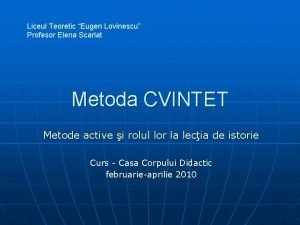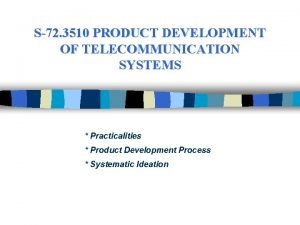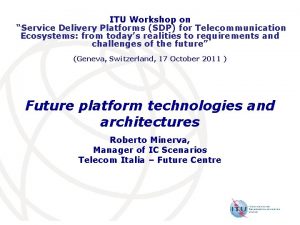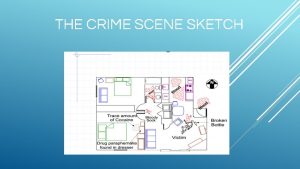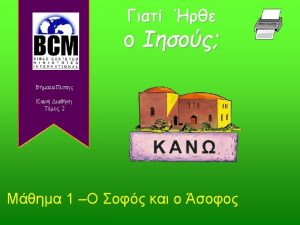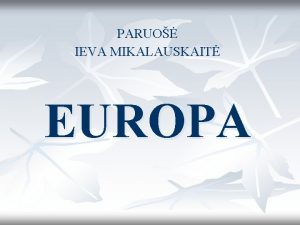Europa Initiative Sketch for a telecoms system Telecoms










- Slides: 10

Europa Initiative Sketch for a telecoms system

Telecoms system functions • NASA mission phases : – Cruise & insertion phases : comms with Earth – Relay for lander : • Comms with Earth • Proximity link with lander • Complementary orbital mission – Probe comms with Earth

Telecoms system elements • Orbiter equipments – To be designed – To cope with : • Lander equipments – JPL-designed • Earth ground segment – NASA DSN

Concept for orbiter/Earth comms • Proposed concept : Juno-like and DSN-compatible • X-band 2 -ways link for : – TC, HK & science TM – Navigation (doppler & ranging) – All mission phases • Radio-science : 2 -bands system – X-band link + – Ka transponder (carrier-only) • Possible upgrade : – Ka science downlink if DSN upgrades to X+Ka ground stations – Increased data rates

Orbiter equipments for Earth comms • X-band system : – Complete RX-TX (transponder, modulation & coding, amplifier) • Possible upgrade to higher spectral efficiency coding & modulation schemes (8 -PSK, 16 -APSK) • Ka band system : – Minimum configuration : transponder for radio science – Optional TX (modulation & coding, amplifier) for science downlink • All equipment duplicated for full redundancy

Orbiter equipments for Earth comms : antennas • HGA : – 3 m-diameter, >45 db gain, 2 -bands (X+Ka) – For TM & radio-science during nominal mission + cruise • MGA : – For TC function during all phases – For TM during manoeuvers (when HGA cannot be pointed) • LGA : – For TC/TM/navigation when MGA cannot be pointed (strong off-point manoeuvers, safe mode) – At least 2 antennas on opposite spacecraft sides, for 4π sr coverage • All fixed antennas, pointing achieved by spacecraft

Concept for orbiter/Earth comms : capacities • Budgets : – Mass / power for minimal system (i. e. w/o Ka TM) : 90 kg / 120 W + Additional shielding to cope with Europa harsh radiation environment • X-band data rates : – TC : VBR up to few kb/s (typically 2 -4) – TM : VBR up to few 100 kb/s (typically 200) – Based on usage of NASA DSN 35 m-diameter antennas

Proximity link • Should this system be designed from scratch, S -band would be suggested : – Recent trade-off for asteroid mission between UFH, S-band, X-band – S-band : best mass/power/volume/performance compromise • But it is not!

Proximity link • Lander concept features a pointed antenna – Best compromise between data rate and power – Probably X-band – Orbiter comms concept : comms with Earth and lander are obvioulsy exclusive • Proposed concept : – Using the same orbiter X-band equipments for Earth comms and proximity link – Using LGA on orbiter to reduce spacecraft pointing requirements • Needs to download orbiter ephemeris to the lander – 1 st contact may need a half-space LGA on lander

Thanks for your attention! Any question?
 Europa romanica si europa gotica schita lectiei
Europa romanica si europa gotica schita lectiei Big data monetization in telecoms
Big data monetization in telecoms Telecoms technology and product development
Telecoms technology and product development Telecoms service delivery platform
Telecoms service delivery platform Final sketch crime scene
Final sketch crime scene Compass point method
Compass point method Deductive reasoning crime scene investigation
Deductive reasoning crime scene investigation Fspos
Fspos Typiska drag för en novell
Typiska drag för en novell Nationell inriktning för artificiell intelligens
Nationell inriktning för artificiell intelligens Vad står k.r.å.k.a.n för
Vad står k.r.å.k.a.n för
